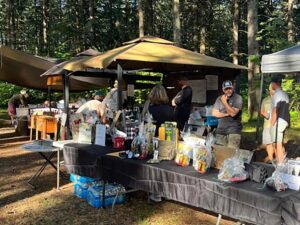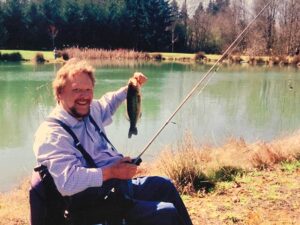Coffee serves as a friendly wake-up call to a misty cold morning where you can see your breath while on the pursuit of that high country mule deer.
There are benefits to different kinds of coffee.
Let’s briefly talk about dark roast coffee which has less caffeine.
It is known that drinking dark roast coffee may help reduce DNA damage in men and women.¹
This is simply due to the beneficial plant compounds found in the coffee bean that positively impact us.
If dark roast coffee can contribute to DNA integrity, it might be a good option for hunters to consume as it could slow down the aging process to some extent.²
Drinking multiple cups of coffee a day is associated with a lower risk of developing heart disease, liver disease, lowered risk of some cancers, dementia, and diabetes compared with drinking no coffee.³
Keep in mind this is one variable (drinking coffee) concerning better health when there are many variables (known and unknown) that contribute to the prevention of chronic diseases.
We have established a few benefits of consuming coffee that could be helpful for us hunters; let us not forget that the timing for when coffee is consumed and the amount are equally important.
It could be wise for hunters to drink coffee before noon, as the later we wait in the day to consume, the more it may negatively impact our sleep that following night.
Once ingested, caffeine circulates throughout our body for a significant amount of time depending on the individual and the amount consumed.
The later we have caffeine and the larger the amount, the greater the odds of it negatively impacting our sleep the following night.
Self-reflect on the reason you were consuming coffee, to begin with.
Was it because you needed the caffeine for energy?
If so, re-assess the purpose of consuming coffee.
Drink coffee for the beneficial plant compounds, positively influence your biological age, reduce damaged DNA, and disease prevention.
If you are tired when you wake up, you need to establish the “cause” that is making you tired. Is it:
- Lack of sleep?
- Lack of natural light exposure?
- What about the quality of food consumed?
- Overconsumption or poor timing of caffeine?
- Lack of physical movement?
- An overabundance of screen time?
- Chronic stress?
A typical fallback for caffeine needs that I often witness throughout society is relying on energy drinks to increase wakefulness.
I advise caution.
For one thing, drinking an energy drink could help you in that tired moment; however, it is not favorable healthspan-wise as it can lead to cardiovascular dysfunction if it has low-quality ingredients.
In the United States alone, the consumption of energy drinks has doubled over the last decade.
They have been connected to cardiac arrhythmias and even sudden cardiac death.⁴
Secondly, it doesn’t address the cause of why you are tired, to begin with!
Energy drinks merely help with the symptom of feeling exhausted at that moment.
This usually leads to buying more energy drinks, which promotes poor physical, mental, and spiritual health in the long run.
Choose coffee rather than energy drinks and look for the cause of why you are tired, to begin with.
Here are four tips to consider when consuming coffee:
1)If you decide to consume coffee, consider increasing your unrefined salt consumption as well, since your electrolyte levels minimize when ingesting coffee.
Caffeine is a diuretic that can cause your body to excrete more of your electrolytes through urination causing you to become dehydrated faster.
My favorite unrefined salts:
- Celtic Sea Salt
- Redmond Real Salt
- Pink Himalayan Salt
2)A good rule of thumb is to delay consumption for at least a few hours after waking up. This strategy minimizes the chances of an afternoon crash.
It also allows our body in the morning a proper transition (balanced hormones) into the day without an external influence which can lead to a better quality of sleep the following night.
For example, if you usually wake up at 6 am and have a cup of coffee, consider trying to wait till 8 am to consume it.
I have personally seen stellar results from this strategy regarding my daily energy, mood, thinking, emotions, and sleep.
3)Aim for either having your coffee straight black with nothing added or with full-fat cream.
Now days there are a plethora of things you can add to your coffee drink that can make it taste like an ice cream.
Which, if that is your mission then go for it.
However, when you add flavors that are sweet, it can cause unnecessary weight gain.
If you drink a coffee with added syrups and flavors every morning for months and months, you can begin to understand why it may be difficult to lean up.
4)If you are experiencing anxiety and stress consistently, consider consuming a different beverage like bone broth till you work on alleviating the cause of the problem along with finding ways to release the negative thoughts and energy.
Anxiety and stress put your body in a position similar to a fight or flight response.
With coffee coming in as well, it could potentially add to the internal imbalance you are experiencing by impacting the cardiovascular system (irregular heartbeats).
A healthy mind with good thoughts is when coffee can do wonders.
Just make sure you consider experimenting with some of the tips to obtain the health benefits and avoid the downfalls.
Check out Black Rifle Coffee Company for good, quality coffee that supports veterans, first responders, and law enforcement.
Coffee and hunting deer are what the doctor should order.
Sign me up for that!
References
¹Schipp, D., Tulinska, J., Sustrova, M., Liskova, A., Spustova, V., Lehotska Mikusova, M., … Shaposhnikov, S. (2019, December). Consumption of a dark roast coffee blend reduces DNA damage in humans: results from a 4-week randomized controlled study. Retrieved from https://www.ncbi.nlm.nih.gov/pubmed/30448878
²Bakuradze, T., Lang, R., Hofmann, T., Eisenbrand, G., Schipp, D., Galan, J., & Richling, E. (2015, February). Consumption of a dark roast coffee decreases the level of spontaneous DNA strand breaks: a randomized controlled trial. Retrieved from https://www.ncbi.nlm.nih.gov/pubmed/24740588
³Wadhawan, M., & Anand, A. C. (2016, March). Coffee and Liver Disease. Retrieved from https://www.ncbi.nlm.nih.gov/pmc/articles/PMC4862107/
⁴Pommerening, M. J., Cardenas, J. C., Radwan, Z. A., Wade, C. E., Holcomb, J. B., & Cotton, B. A. (2015, December). Hypercoagulability after energy drink consumption. Retrieved from https://www.ncbi.nlm.nih.gov/pubmed/26188956







